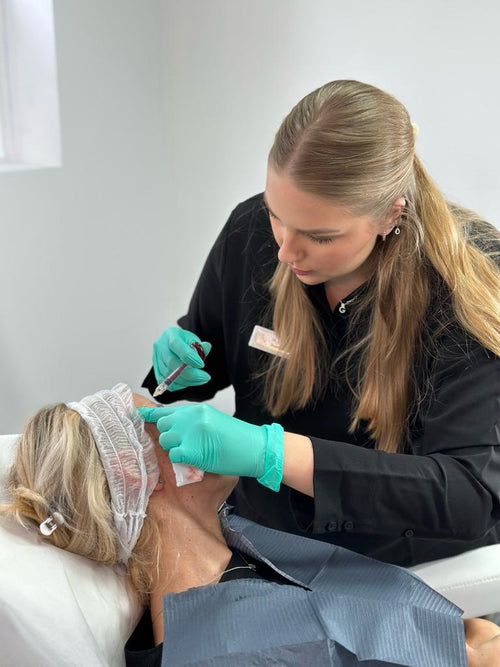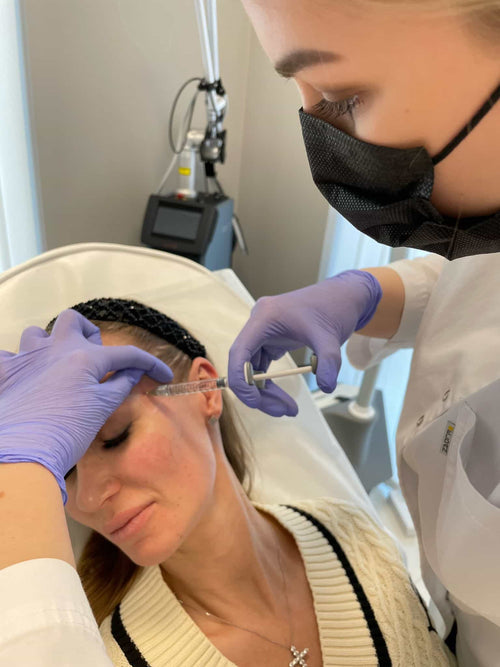Reserve Your Dermal Filler Consultation with Dr. Laura Geige

## Individuals With Certain Medical Conditions
Individuals with certain medical conditions may be advised against undergoing dermal filler injections due to potential risks or complications.
Here are some examples:
**Active Skin Infections:** Dermal fillers are injected into the skin, so having an active infection in the area of treatment could worsen the condition and lead to spread of bacteria.
**Autoimmune Diseases:** People with autoimmune diseases like lupus or scleroderma have compromised immune systems. Fillers could trigger an adverse reaction or exacerbate their existing condition.
**Blood Clotting Disorders:** Individuals with blood clotting disorders, such as hemophilia, are at increased risk of bleeding complications after filler injections.
**Certain Medications:** Some medications, like blood thinners or retinoids, can increase the risk of bruising or swelling after filler treatment.
Pregnancy and Breastfeeding: The safety of dermal fillers during pregnancy and breastfeeding has not been fully established. It’s best to err on the side of caution and avoid them until after this period.
**Allergies:** Individuals with a history of allergies to medications, latex, or other substances should inform their doctor before getting fillers.
**Neuromuscular Disorders:** Conditions like Parkinson’s disease or multiple sclerosis can affect muscle function and may make it unsafe to receive filler injections.
It is essential for anyone considering dermal fillers to consult with a qualified medical professional. They will assess the individual’s medical history, discuss potential risks and benefits, and determine if filler injections are appropriate.
History of Blood Clots
Certain Skin Infections or Diseases
Pregnancy and Breastfeeding
## People with Active Allergies
Pregnancy and breastfeeding are times when a person’s body undergoes significant changes, requiring careful consideration regarding potential allergens and medical procedures.

Secure Your Dermal Filler Appointment with Dr. Laura Geige
For individuals with active allergies, it’s crucial to consult with their allergist and primary care physician before undergoing any cosmetic procedures, including dermal fillers.
Here’s why:
- Increased Risk of Allergic Reactions: During pregnancy and breastfeeding, the body’s immune system is heightened, making individuals more susceptible to allergic reactions, even to substances they’ve tolerated before.
- Impact on Breast Milk: Certain fillers or their ingredients may be excreted in breast milk, potentially affecting a nursing infant. The long-term effects of this exposure are not always fully understood.
- Hormonal Fluctuations: Pregnancy and breastfeeding cause significant hormonal shifts that can influence the body’s response to fillers and increase the risk of complications.
Schedule a Dermal Filler Appointment with Dr. Laura Geige
In addition to the general concerns, specific types of allergies warrant extra caution:
- Hyaluronic Acid Fillers: While generally safe, hyaluronic acid is a naturally occurring substance that can still trigger allergic reactions in some individuals. It’s important to discuss your allergy history with your doctor.
- Animal-Derived Fillers: Some fillers contain ingredients derived from animals (e.g., collagen). Individuals with allergies to these animal products should avoid such fillers.
The decision to have fillers during pregnancy or breastfeeding is a personal one that should be made in consultation with healthcare professionals. A thorough evaluation of your medical history, allergy profile, and individual circumstances will help determine the safest course of action.
Remember, prioritizing your health and the well-being of your baby are paramount.
To Fillers Specifically
To Other Injected Substances
## Individuals Taking Specific Medications
Individuals taking certain medications may experience complications when undergoing cosmetic injectables like fillers. It’s crucial for potential patients to consult with a qualified medical professional before getting any injections to determine if they are suitable candidates.
Here’s a breakdown of individuals who should exercise caution or avoid fillers due to medication interactions:
Anti-Coagulants (Blood Thinners): These medications, such as warfarin or heparin, increase the risk of bleeding. Fillers can also cause bruising and swelling, which could exacerbate bleeding complications. Individuals on blood thinners should discuss alternative treatment options with their doctor.
Anti-Inflammatory Medications (NSAIDs): Nonsteroidal anti-inflammatory drugs like ibuprofen and naproxen** can interfere with the body’s ability to clot blood, increasing the risk of bleeding at the injection site. It’s important for individuals taking NSAIDs to inform their injector.
Retinoids (Vitamin A Derivatives): These medications, often used for acne treatment, can thin the skin and make it more susceptible to bruising and damage. Using fillers while on retinoids may lead to undesirable results or complications. Patients should consult with their doctor about timing filler treatments in relation to retinoid use.
Other Medications that May Pose a Risk:**
– **Corticosteroids**: Can weaken the skin and increase the risk of infection.
– **Immunosuppressants**: Can impair the body’s ability to heal.
It is essential for individuals taking any medication, especially those listed above, to have a thorough consultation with their doctor or a qualified injector. They can assess individual risks, recommend alternative treatments if necessary, and provide guidance on how to minimize potential complications.
Blood Thinners
Antibiotics
Immunosuppressants
Decléor Direct Fashionably Balanced Fringe Beverly Hills Josie Barrett
- How Much Is Lip Filler In The Uk - May 1, 2025
- Can Guys Feel Lip Fillers When Kissing? - May 1, 2025
- Botox Anti-Wrinkle Treatments In Walton-on-Thames, Surrey - April 29, 2025
